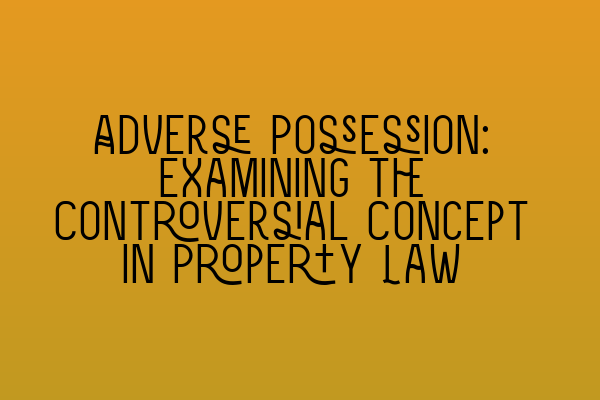Adverse Possession: Examining the Controversial Concept in Property Law
Property law is a complex and fascinating area of legal practice, with various principles and concepts that can sometimes spark controversy. One such concept is adverse possession, which involves the acquisition of ownership rights over another person’s property through continuous and uninterrupted possession.
Adverse possession has long been a topic of debate and discussion among Property Law experts, and this blog post aims to provide a comprehensive examination of this controversial concept. We will delve into the legal framework surrounding adverse possession, explore its historical origins, and analyze its practical implications.
The Legal Framework of Adverse Possession
In order to better understand adverse possession, it is essential to explore the legal framework within which it operates. Under common law, adverse possession is based on the principle of “use it or lose it.” This principle allows a person who possesses land without the owner’s consent for a specified period to claim legal ownership.
Adverse possession is also governed by statutory provisions in various jurisdictions, including the Limitation Act 1980 in England and Wales. These statutes impose specific requirements and timeframes for adverse possession claims, ensuring that possession must be open, notorious, exclusive, and continuous for a specified period.
The Historical Origins of Adverse Possession
The concept of adverse possession can be traced back to ancient legal systems, including Roman law. In Roman times, the idea of acquiring ownership through land possession without the consent of the owner was prevalent.
Adverse possession also has roots in the feudal system, where land ownership was concentrated in the hands of the nobility. Due to societal changes and the need to encourage land utilization, adverse possession emerged as a means to compensate those who improved neglected or abandoned land.
Analyzing the Practical Implications of Adverse Possession
Adverse possession has significant practical implications, particularly for property owners and potential claimants. Property owners may find themselves at risk of losing their land if another person satisfies the requirements for adverse possession.
Due to its potentially contentious nature, adverse possession cases often involve complex legal disputes and require a thorough examination of the evidence presented. It is crucial for property owners to remain vigilant and seek legal advice to protect their interests and prevent adverse possession claims.
On the other hand, potential claimants seeking to establish adverse possession must meet various statutory requirements, such as demonstrating exclusive possession over a specified period. They must also consider potential defenses raised by the current property owner, such as interruption in possession or correct legal documentation.
Considering the intricacies of adverse possession, it is essential for both property owners and potential claimants to consult a qualified property law solicitor who specializes in adverse possession cases. With their expertise and knowledge of the legal framework, these solicitors can offer valuable guidance and representation throughout the process.
Conclusion
Adverse possession remains a controversial concept in property law, often evoking passionate discussions among legal professionals. Its historical origins, legal framework, and practical implications make it a topic of interest for anyone involved in property transactions or disputes.
If you require further information or legal assistance regarding adverse possession or other property law matters, do not hesitate to reach out to SQE Property Law & Land Law. Our team of experienced solicitors can provide the expert advice and representation you need.
Related Articles:
